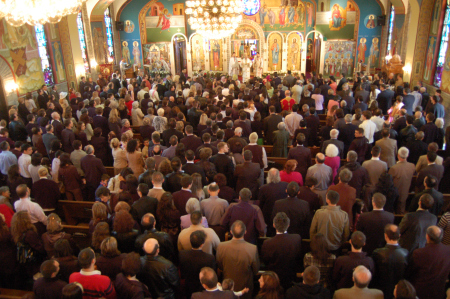T
Thekla
Guest
Hiya...
Thanks I checked that out...it seems that most agree it dated from around 250AD...I would really like to follow how it developed from there and who established it as an 'acceptable practice' for Christians and by what 'authority' they made the ruling.
Please excuse me if some of this is repetition for you !
At any rate, the date of origin of this hymn/prayer is unknown, but indeed the record of it is quite early. From what I know, there is not a clear record of the use before and after (perhaps in part because not much has survived from that period, and it can't be assumed that everything was written).
Similar hymn/prayers are used for multitudes of Saints - you will hear them chanted weekly in parishes of their "namesake", and on the Feast day/commemoration. Being steeped in the Liturgical life 'interprets' their use; there is a default understanding that we are asking for their prayers to God. Their lives in Christ, which represent the victory of Christ in each Saint, are examples for us. And that it is God working, in and through them, that is the ultimate source of the answer - like the healings in the NT after the Ascension of Christ.
Precedent for asking the righteous departed for their prayers to God exists in Judaism, and according to several (Jewish) sources this originates with Joseph the Patriarch. (If you google "Rachel's Tomb", you can read about this.) As I've mentioned before, neither Christ nor the Apostles are recorded as commenting on or 'correcting' this practice.
In Christianity, which early saw itself as the 'fulfillment' of Judaism in Christ, much was brought forward - the hours of prayer, chanting of the Psalms/hymns, etc. Now that the understanding was that Christ had indeed 'recapitulated all things, Heaven and earth', joined in His body by the Holy Spirit (Heaven and earth), and 'come to the Heavenly Jerusalem, to the spirits of just men made perfect (completed) - asking those who are present with us in in Him would seem 'natural/normal'.
Some of the thoughts I am pursuing, no longer challenge Othodoxy and Catholicism over their primacy as the oldest established elements of the ekklesia...but rather the source of their authority, and whether some of their practices (ones that I struggle to see biblically) have not tainted what started off as ancient congregations in the tradition of the biblical Apostles and polluted some of the purity by adopting teachings and traditions that run contrary to sound doctrine.
I don't mean to be prickly, but to this must be asked "what/which" sound doctrine, and from where does this derive its authority ? And also in what particular way is the practice viewed which might be different from the view of its practitioners ? Biblically, we do know that God hears and answers the prayers of the departed - He answers Rachel with reassurance (Jeremiah). Then also, how we understand the verses (above) from Paul, can locate or not depending on understanding, this practice.
It is like trying to fit a very large, difficult jig-saw together and being unsure if all the pieces are actually on the table....then trying to force some pieces into places where they just won't fit.
Maybe you're forcing the pieces into the wrong place - try another area of the puzzle
"I have always hated doing jig-saws...but this is a different type.''
God bless your efforts +
Upvote
0




